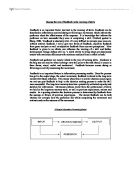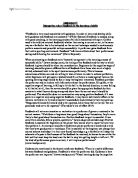However at the associative stage there needs to be both even levels of negative and positive feedback, as at this stage they are heading towards perfecting their technique, and at this stage it is important to learn the correct technique in order to advance to the next stage. The associative stage involves practice of the skill that they have learned in the cognitive
The autonomous stage occurs when the performer can successfully repeat a skill with thought. At the autonomous stage the performer still needs to receive positive feedback but not too often as it could deceive their view of how well they perform a skill. The performer will not be sure of how well that they are performing. If the outcome of their attempt is negative and they receive positive feedback it could confuse the performer. Constructive criticism needs to be plentiful.
Intrinsic feedback occurs more at autonomous and associative phases rather than at the cognitive phase, as at this stage the learner is not so able to evaluate their performance. Intrinsic feedback occurs a lot more at the autonomous stage, as the performer will be more concerned about how they are playing, and evaluate themselves more than at the associative phase.
Extrinsic feedback is found at all three phases of learning. However the source of this feedback changes depending on the phase that a person is at, as well as the amount that they receive. At the cognitive stage, extrinsic feedback is a prominent feature in order to encourage the learner to achieve their goal. The feedback could come from a teacher, a coach or even a fellow teammate.
A coach is the most likely to provide the most valuable of all the feedback. A coach will usually give constant feedback, as they probably have a depth of knowledge of their specified sport. This continuous feedback is essential for the performer because they can constantly improve their technique on the go without having to go away and learn by themselves. Distributed practice is also good for learners who lack fitness and experience.
The same method for teaching a racket sport can be used for a team game like football. Learning can be complicated and hard going for a beginner.
This is Welfords model of information processing:
“A learner can not take in and understand as much information as an expert or even an intermediate can. An experts DCR process is much quicker, they have learned to use selective attention, to prioritise information and discard irrelevant information. Intermediates learn at a quicker rate them beginners but lack the sharpness and capability to 'bunch' information into relevant groups like an expert can, e.g. a football player ignores an aeroplane overhead but complies with the referees whistle. When teaching football, a beginner needs lots of attention and encouragement, using positive feedback.”
Performers need visual guidance as this reinforces feedback. Visual learning during the cognitive phase helps the learner to develop a mental picture of the task. A footballer would remember how their coach showed them how to use the instep of the boot and can perform the task properly. It is best to have one-on-one tuition with the coach to gain the basics of performing the skill. If a performer learns a skill, the skill will go into their short term memory and receives positive feedback and enjoys it, the skill will go into their long term memory and will remember it. That is how positive feedback works in the aspect of encouraging the performer will make them remember what they are being taught.
There is also the feedback of results and performance which can be very helpful when improving a technique. Feedback is extremely important in the learning of new skills. My class did an experiment using tennis with one pair receiving only knowledge of results and the other receiving some knowledge of performance feedback as well.
The graph shows that knowledge of results and performance is much more beneficial than only knowledge of results. This experiment does however have its limitations:
- 1 of the pairs could actually be better at the experiment in the first place.
- Also the equipment could be slightly different which could affect the results.
This experiment also shows the importance of any sort of feedback. Without any feedback at all the performer is not likely to improve their technique and soon become demotivated.
In conclusion it can be seen that feedback is extremely important in the learning of new skills. It is important for the performer to receive the correct type of feedback, e.g. extrinsic or knowledge of results. Each different type of feedback can help in a different way. Negative feedback is not useful to a beginner as it will soon become boring for them. If a performer is elite then knowledge of results can be very important. In sprinting the performer would only be interested in their results. This is the worthwhile feedback for them. Also the time when they receive this feedback can be vital. In the cognitive stage positive feedback is essential to make sure the skill is learned successfully. In the autonomous stage knowledge of results and performance is essential.







